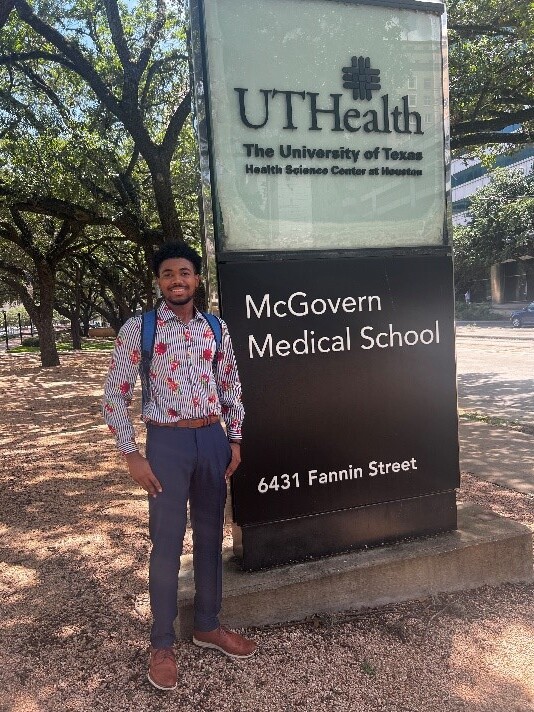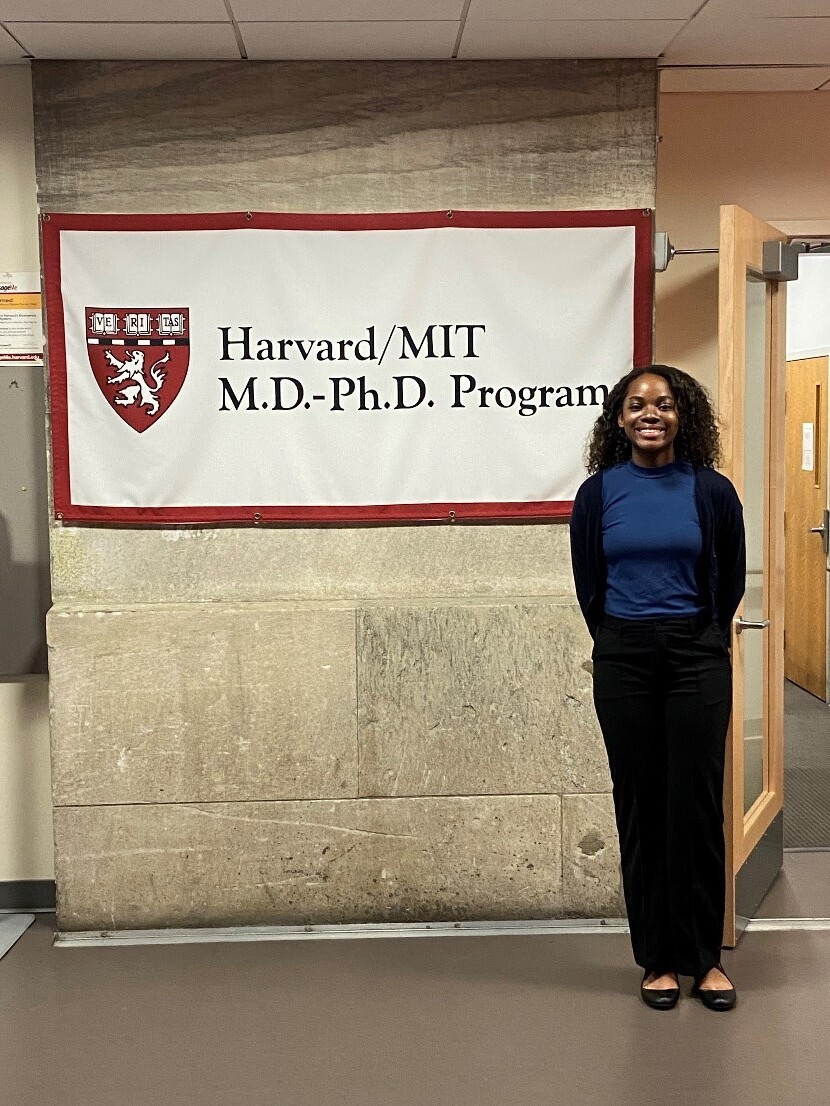
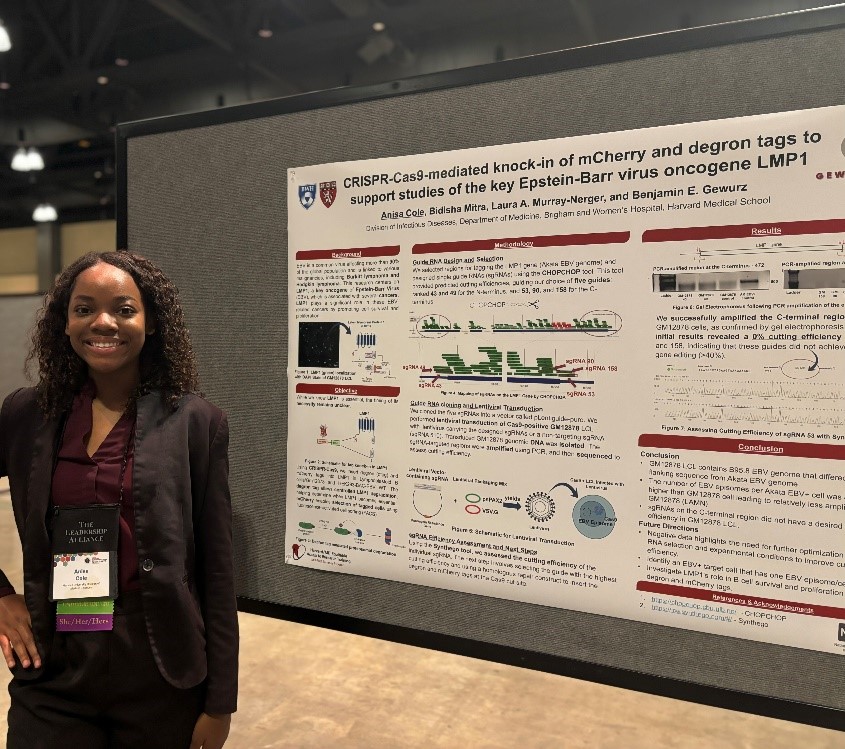
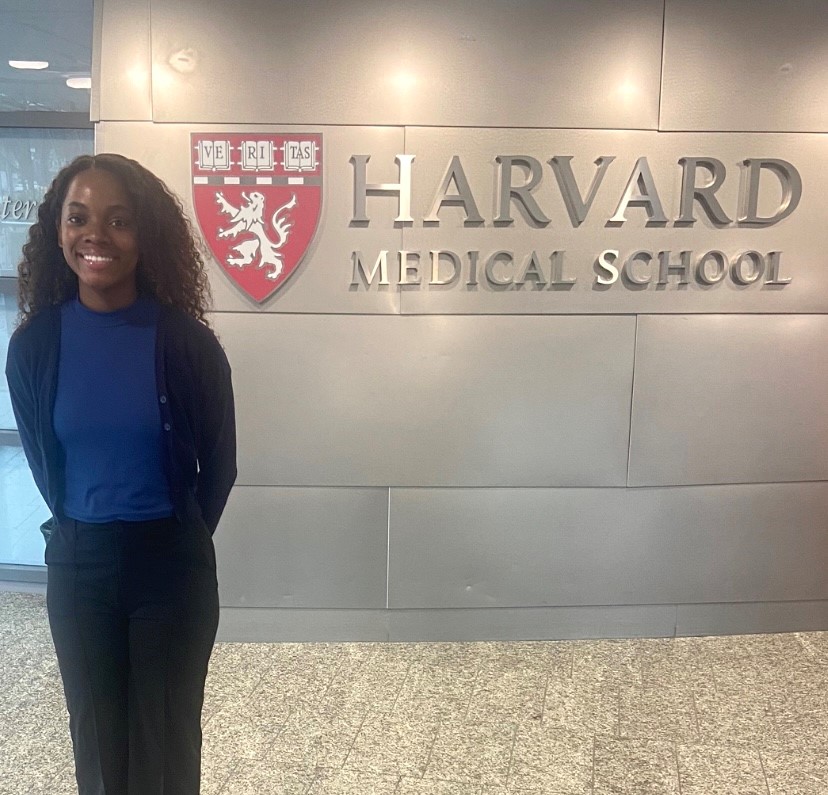
Anisa Cole, 2023 Mercury Class
This summer, I had the extraordinary opportunity to be one of only nine students accepted into the prestigious Harvard/MIT Equitable Access to Research Training (HEART) MD-PhD Summer Program, a specialized track within the Summer Honors Undergraduate Research Program (SHURP) at Harvard Medical School.
During the program, I interned in the lab of Dr. Benjamin Gewurz MD, PhD at Brigham and Women’s Hospital’s Infectious Disease Division, where I conducted research on the pathophysiology of Epstein-Barr Virus (EBV). I worked closely with Dr. Bidisha Mitra to study the role of LMP1, a key protein in Epstein-Barr virus (EBV)-associated B cell cancers, using CRISPR “knock-in” techniques to tag and investigate its function in lymphoblastoid cell lines. Working in such a high-caliber research environment, surrounded by some of the brightest minds in the field, was both challenging and exhilarating. It reaffirmed my commitment to pursuing a career as a physician-scientist, where I hope to continue contributing to cutting-edge research while also providing compassionate care to patients.
In addition to my research, I had the privilege of shadowing Dr. Gewurz as he made rounds in infectious diseases at the hospital, observing firsthand the intersection of research and patient care. This experience was complemented by biweekly shadowing at the Crimson Care Collaborative, a student-run clinic at Harvard Medical School, where I was able to observe and learn from physicians at both Beth Israel Deaconess Medical Center and Massachusetts General Hospital. These clinical exposures not only enhanced my understanding of patient care but also deepened my desire to bridge the gap between research and medicine, especially in underserved communities.
Being selected for the HEART program was not just an academic achievement; it was a testament to the importance of diversity in science and medicine. The HEART program is designed to create equitable opportunities for students from underrepresented and disadvantaged backgrounds who are interested in MD-PhD training. As someone who has always been passionate about contributing to a future where individuals like myself have a seat at the table in the scientific and medical communities, being part of this program felt like a dream come true.
Keeland Harville, 2023 Mercury Class
This summer I had the opportunity to research at Cincinnati Children’s Hospital, specifically in the division of Allergy and Immunology. I focused on penicillin allergy labels within the pediatric population and built a REDCap database to conduct this study. I had an amazing summer in which I learned so much about research, and I am excited to continue researching in the future.




Debra Davis, 2023 Mercury Class
During the summer, I was awarded an opportunity to engage in an international research experience at Sorbonne Université in Paris, France, where I learned the theoretical and practical application of Fourier-Transform Ion Cyclotron Resonance (FT-ICR) mass spectrometry. FT-ICR is a mass analyzer that provides ultra-high resolution to detect and characterize molecules. The purpose of using an instrument of this caliber is to elucidate the relative abundance of ions at varying masses through enhanced signal amplification. Over 12 weeks, I contributed to developing a suitable method for utilizing FT-ICR to assess the effects of environmental stresses on the molecular composition of dissolved organic matter in aquatic environments.
This experience has significantly boosted my confidence as a researcher, affirming my application of intellectual rigor in unfamiliar settings. Initially intimidating, I learned to transcend my apprehensions by embracing risks, understanding that personal and professional growth often stems from stepping outside one’s comfort zone. The experience underscored the importance of cross-cultural collaboration in adapting to new environments. As I navigated the language barrier, I became accustomed to my surroundings through outward engagement with native French speakers. Working alongside a brilliant, multilingual team inspired me to learn a new language, highlighting patience as an integral element in mastering new skills and nurturing mutual understanding. This experience has enabled me to extend grace to myself and others.
I am eager to continue this journey by participating in the Spring 2025 American Chemical Society conference in San Diego, California. There, I will present our findings on the effects of antibiotics and climate change on the molecular composition of dissolved organic matter in water, as analyzed through FT-ICR mass spectrometry.
Kenton Moore, 2023 Mercury Class
This summer, I interned at the Johns Hopkins Bloomberg School of Public Health in Baltimore, Maryland, as part of the Hopkins Undergraduate Summer Training and Research (USTAR) program. USTAR is a 10-week, 2-summer program targeted toward students interested in aging research. As a part of the program, I was matched with a research advisor, Dr. Carrie Nieman, M.D, M.Ph. Dr. Nieman is an ENT surgeon who works at the Johns Hopkins Hospital; she also conducts public health research, studying the sociological barriers that prevent access to hearing healthcare. Under Dr. Nieman’s guidance, I assisted her with one of her public health projects, researching the barriers that prevent elder Korean Americans from receiving hearing healthcare at a rate similar to other racial and ethnic groups in the US. I created a poster on the research I did and was able to present it during a program poster presentation at the end of the summer. This summer was amazing; I loved exploring Baltimore, interacting with my cohort, and learning about public health. I plan on returning to Hopkins next summer to continue my research.
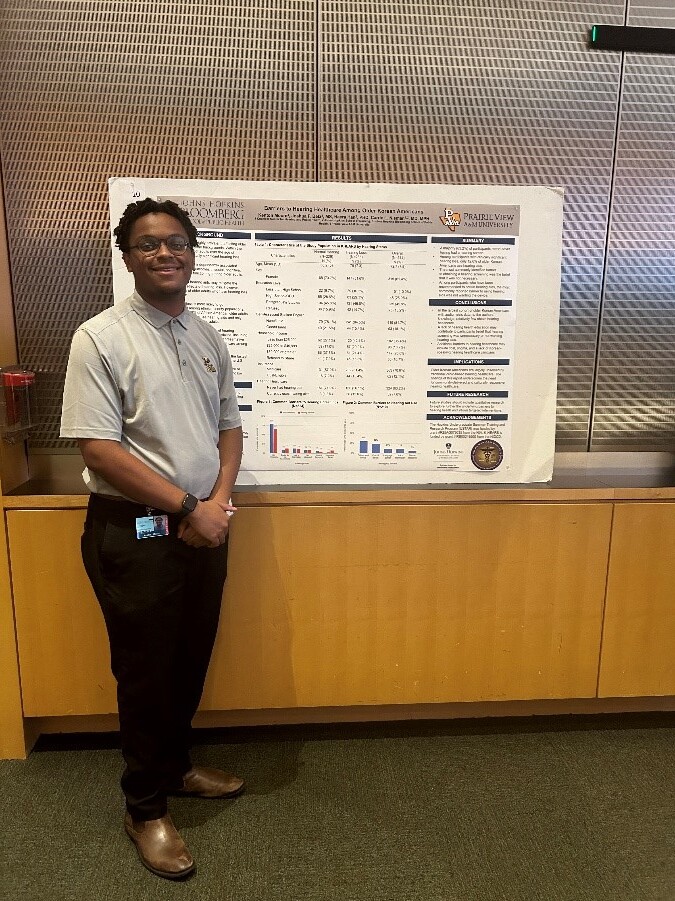


Eryka Appiah-Amaning, 2022 Jade Class
This summer, I had the privilege of participating in a transformative 10-week research internship at the Holden Comprehensive Cancer Center at the University of Iowa. Working in the Howard Lab, my research focused on addressing Diffuse Intrinsic Pontine Glioma (DIPG), a rare and aggressive pediatric brain tumor with one of the lowest survival rates among childhood cancers.
Under the mentorship of Dr. Michelle Howard, my project aimed to identify a therapeutic agent that could enhance radiation therapy for DIPG patients by disrupting redox regulation within the tumor. At the end of my internship, I was excited to present my findings through an oral presentation and a poster at the UI Summer Undergraduate Research Conference.
I am deeply grateful to the Texas Undergraduate Medical Academy for connecting me to this invaluable opportunity and encouraging me to take a bold step out of my comfort zone!
Caleb Owens, 2023 Jasper Scholar
Conducted in Dr. May’s lab, my research delved into understanding how Vitamin D3 influences the immune response to Mycobacterium tuberculosis. Using Matlab, we developed regression equations representing bacterial load as a function of time, IL-12, IL-10, TNF-α, NO, H2O2, and LDH during high and low Mycobacterium tuberculosis.
This presentation marks the culmination of my incredible 10-week journey through the CMBS program in Wisconsin and the Frontiers in Science (FIS) program in Houston. During my time in Wisconsin, I had the opportunity to deliver a final PowerPoint presentation at the Pyle Center. Additionally, I concluded the FIS program with a final poster session at Rice University’s Bioscience Research Collaborative facility on August 2nd.
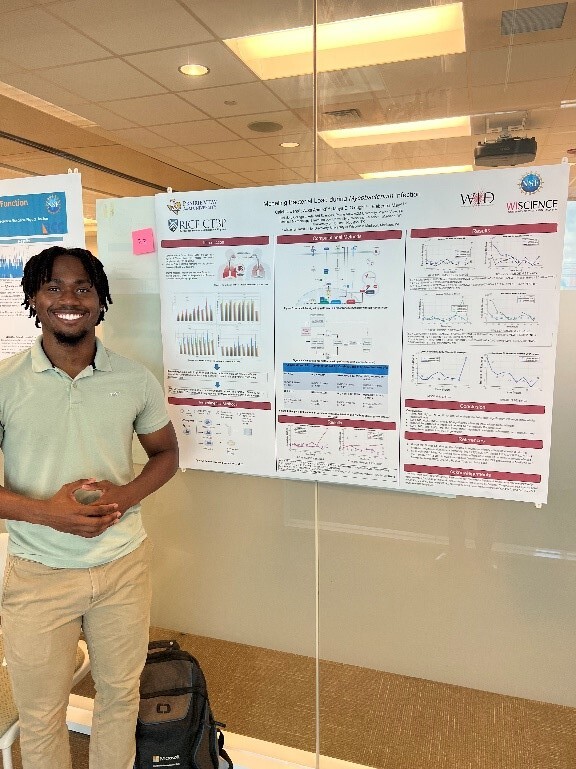


Mariata Ba, 2022 Jade Class
In the course of my internship at the Memorial Sloan Kettering Cancer Center (in New York), I was provided with the opportunity of developing new skills and abilities, in addition to expanding my knowledge and learning many essential research techniques. Furthermore, I have also had the privilege of forming new connections, learning from my mentors, and interacting with other students in the program, with whom I shared similar motives and objectives. During my time, I was able to conduct various experiments to determine the effects that different doses/concentrations of the drugs/inhibitors (Avutometinib and Trametinib) would have on relevant pathways such as PI3K and RAS, essential proteins, as well as the overall growth of specific lung and melanoma cancer cell lines. Throughout the process, I have cultured, treated, collected, and utilized BCA to prepare the Lung cell line NCI-H1666 as well as the Melanoma cell lines SK-MEL-208 and SK-MEL-264, prior to then running western blots and analyzing the data. These procedures were done in order to determine and evaluate the outcomes that were derived, all while ensuring that the conclusions made in the end were analytical, logical, and correct based on the overall experiments, alongside the results that were obtained.
Alexay Bullard, 2023 Jasper Scholar
This summer I was in SHPEP where they educated us on health professions through lectures and seminars. I was also able to do several simulations like an Intraosseous infusion, intubation, drawing blood, intravenous infusion, suturing, case studies, and working with patient care mannequins. I was also able to shadow a pediatric surgeon and a geriatric family medicine doctor. I would recommend SHPEP for any student eligible that wants an immersive experience into the world of a health professional.
